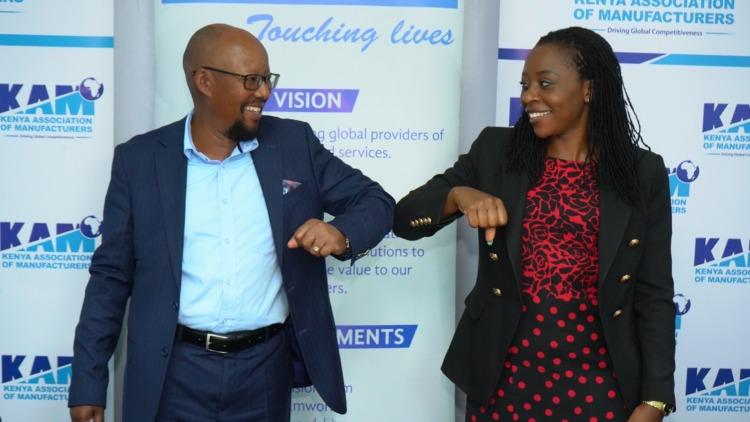- Posta’s network has more than 600 branches countrywide
- Africa is now implementing the Africa free Continental Trade Area
- For AfCFTA to be successful, all African countries must address more non-tariff barriers and build value chains in the various regions.
The Kenya Association of Manufacturers (KAM) and the Postal Corporation of Kenya (PCK) have forged a strategic partnership to tap into e-commerce business and intra-regional trade for its members.
Speaking during the signing of the agreement, Phyllis Wakiaga, the CEO of KAM said, “Posta’s network of more 600 branches countrywide, and linkages with other postal organisations in the African region would come in handy for exports and imports, at a time when Africa is implementing the Africa free Continental Trade Area (AfCFTA).”
The partnership will see PCK offer same day and overnight courier services, rider dedicated services, clearing and forwarding services to the association and its members.
Read: AfCFTA sounds the death knell for AGOA
Under the agreement, the two parties also plan to implement programmes such as international courier services, direct mail marketing and training of KAM members on how to capitalise on the collaboration.
Dan Kagwe, the CEO and Postmaster General of the PCK said the corporation would offer discounted rates and dedicated courier services, as it pursues its quest to be an aggregator of courier and delivery services countrywide.
Kagwe said Africa can only realise rapid economic growth by “harnessing its production capacities and tapping intra-Africa trade opportunities available through connecting more than 1.2 billion people across 54 African countries.”
In the new partnership, the two organisations will work together to mobilise resources through training programmes, with a view to funding the operations and delivery of the objectives of the memorandum of understanding (MoU).
The MoU will be implemented by a joint management committee that will be charged with coordination of collaborative activities, monitoring implementation of joint activities, and exploring emerging opportunities to deepen the partnership.
KAM’s partnership with the PCK follows a recent partnership with the Trademark East Africa (TMEA) where PCK secured US$650,000 KSh72 million from TMEA to improve Posta’s digital services, to enable it to effectively support e-commerce in the East African region.
“It is a great beginning that will open doors for Posta to work with diverse stakeholders and access the potential that exists in the East African region,” said Mr. Kagwe. Notably, the country and region at large have over time experienced a rapid shift from traditional mail, money order and stamp sales to the growth of e-commerce and packages below 10kgs that are relatable to SMEs.
Against the backdrop of the Covid-19 pandemic, PCK is keen to tap into the growth of small parcels and e-commerce items within the postal systems of Kenya from an average of 1800 items every four days in 2018 to 2300 per day in 2021.
As part of the partnership, the corporation intends to increase its capacity to process 10,000 packages daily to provide an efficient logistics and distribution platform for e-commerce entrepreneurs and customers.
Read: What the AfCFTA means for Africa’s mining sector
This comes after the East African Business Council (EABC) warned that the benefits of the AfCFTA will not materialise without the pending trade barriers being addressed.
The lack of harmonised standards, failure to implement the Single African Air Transport Market (Saatm) and the export of raw commodities remain the continent’s biggest obstacles to trade. In addition, African countries have some of the most rigid visa and work permit requirements, they have multiple testing agencies and erect unnecessary roadblocks for random checks along transport corridors which increases the cost of cross-border trade.
This, eventually, deals a blow to the Micro, Small and Medium Enterprises (MSMEs) which also happen to be the backbone of the continent’s economy.
EABC trade and policy advisor, Adrian Njau, says that for AfCFTA to be successful, all African countries must address more non-tariff barriers and build value chains in the various regions.
Currently, Njau says that harmonisation of product standards stands at a mere 13.6 per cent which creates a huge potential for NTBs in cross-border trade in the continent.
Njau adds that for Africa to benefit fully from the FTA, it has to create an internal market for products from the African markets which must commence manufacturing value-added goods while working to deepen regional value chains.
Unless African businesses take full advantage of the available trade and investment opportunities, then the AfCFTA objectives will continue being elusive, according to the executive director of the Tanzania Private Sector Foundation (TPSF), Francis Nanai.
Read: Private sector-led approach to boost trade under AfCFTA
